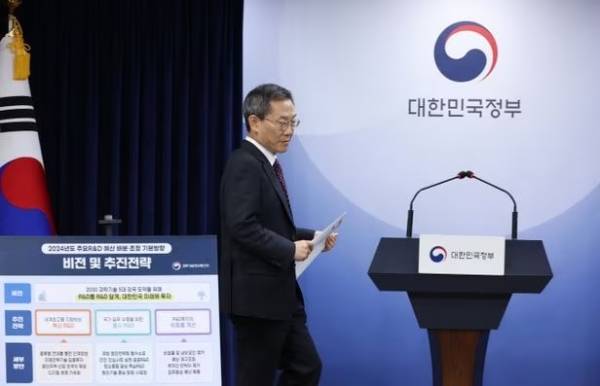
Yoon Suk Yeol, the President of the Republic of Korea, is currently at war with the so-called domestic cartels. His vision to eradicate groups of people seeking to protect their vested interests has had a comprehensive impact on domestic politics. His recent effort to reform the education system that requires students to rely on private tutors comes from a similar motivation. Now, the government’s attention has shifted toward the R&D sector as they set out to reduce two trillion KRW R&D funding in 2024. Lee Jung-num’s office from the Democratic Party of Korea has released a thorough analysis of the government’s funding plan and found 317 projects overseen by the Ministry of Science and ICT have had their funds radically deducted. That is 50.2% of all government projects overseen by the Ministry and 60.8% of which are R&D projects. Those projects aim to develop technologies needed for net-zero emission, advancements in AI, semiconductors, quantum computing, space technology, and numerous other equally significant issues to national security.
At a joint government briefing on economic policy, President Yoon coined the term “R&D cartel,” but he failed to demystify its ambiguous nature, in effect framing all scientists and researchers as criminal offenders altogether. There are in fact countless concerns over the president’s new approach. Yoo Seong-Min, a former member of the National Assembly, said during a radio interview with MBC, “The president nowadays is obsessed with the term cartel.” This kind of “good versus evil” narrative only exacerbates the division between ideologies which might do more harm than good. Moreover, the government’s amateur management has only caused greater chaos as researchers have no way of knowing why or by exactly how much their funding has been cut. Even the government document addressed to the National Assembly does not outline in detail which projects will go through the deduction nor by how much. The administration failed to consider the unique circumstances of each project and has hastily taken a top-down approach, evidently causing confusion and opposition. Meanwhile, related workers and researchers are suffering through the consequences of the president’s immature decision. His abrupt decision revokes 33 years of precedence. Korea’s R&D funding has never decreased, even during the IMF crisis.
Scientific communities and major STEM universities have expressed grave concerns and are holding press conferences to set out a clear message to the nation: “We are fundamentally against the government’s holistic and thoughtless plan to forcefully reduce R&D funding.” There have not been public discussions nor consensus with the scientific community prior to the momentous decision, and as a consequence, it only hinders the progress of major R&D projects, many of which are tied to the issues of national security. This decision furthermore has a profound rippling effect as it disincentivizes new students from coming into the field of STEM. The loss of manpower inevitably means losing competitiveness in the fierce global market, which, by the way, is an issue Korea is already facing with its declining birth rate. Postdocs and graduate researchers at government research facilities are already being laid off, and one out of five R&D projects are being terminated prematurely. The effects of the deduction seem not only to eliminate R&D cartels but also innocent and benevolent researchers indiscriminately.
R&D inherently requires long-term investment; thus, its return is not immediate. Nevertheless, a country’s economy can evidently benefit from it. Most countries globally are increasing their R&D funding every year as they know it goes hand-in-hand with their economic growth. According to a survey on global R&D expenditure from the Congressional Research Service, there has been a significant increase in “governmental R&D fundings in other countries [non-U.S.], which have recognized the importance of R&D to their industrial innovation and competitiveness.” R&D investments in the U.S., for example, increased by USD 51 billion in 2020 to USD 717 billion compared to the previous year, according to U.S. National Science Foundation. Another survey from the UK shows that “every GBP 1 spent on public R&D generates approximately GBP 7 of net economic benefit to the UK and delivers GBP 1.40 of private investment.” Given the increasing global trend, the Korean government’s unorthodox decision seems counterproductive on every level.


